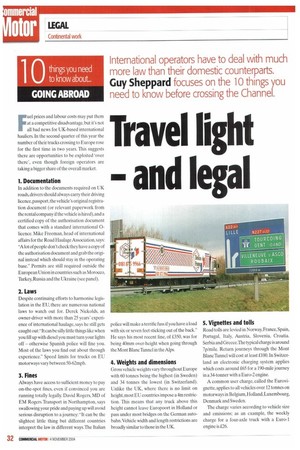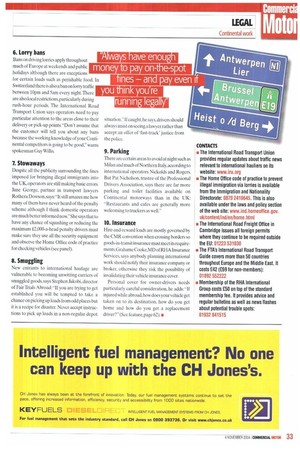Travel light and legal
Page 32

Page 33

If you've noticed an error in this article please click here to report it so we can fix it.
Fuel prices and labour costs may put them at a competitive disadvantage, but its not all bad news for UK-based international hauliers. In the second quarter of this year the number of their trucks crossing to Europe rose for the first time in two years. This suggests there are opportunities to be exploited 'over there', even though foreign operators are taking a bigger share of the overall market.
1. Documentation
In addition to the documents required on UK roads, drivers should always carry their driving licence, passport, the vehicle's original registration document (or relevant paperwork from the rental company if the vehicle is hired), and a certified copy of the authorisation document that comes with a standard international 0licence. Mike Freeman, head of international affairs for the Road Haulage Association, says: "A lot of people don't check they have a copy of the authorisation document and grab the original instead which should stay in the operating base." Permits are still required outside the European Union in countries such as Morocco, Ibrkey,Russia and the Ukraine (see panel).
2. Laws Despite continuing efforts to harmonise legislation in the EU, there are numerous national laws to watch out for. Derek Nickolds, an owner-driver with more than 25 years' experience of international haulage, says he still gets caught out:-It can be silly little things like when you fill up with diesel you must turn your lights off otherwise Spanish police will fine you. Most of the laws you find out about through experience." Speed limits for trucks on EU motorways vary between 50-62mph.
3. Fines
Always have access to sufficient money to pay on-the-spot lines, even if convinced you are running totally legally. David Rogers, MD of EM Rogers Transport in Northampton, says swallowing your pride and paying up will avoid serious disruption to a journey: "It can be the slightest little thing but different countries interpret the law in different ways. The Italian police will make a terrific fuss if you have a load with six or seven feet sticking out of the back." He says his most recent fine, of £350, was for being 40mm over-height when going through the Mont Blanc Tunnel in the Alps.
4. Weights and dimensions
Gross vehicle weights vary throughout Europe with 60 tonnes being the highest (in Sweden) and 34 tonnes the lowest (in Switzerland). Unlike the UK, where there is no limit on height, most EU countries impose a 4m restriction. This means that any truck above this height cannot leave Europoort in Holland or pass under most bridges on the German autobahn. Vehicle width and length restrictions are broadly similar to those in the UK.
5. Vignettes and tolls
Road tolls are levied in Norway, France, Spain, Portugal, Italy, Austria, Slovenia, Croatia. Serbia and Greece.The typical charge is around 7p/mile. Return journeys through the Mont Blanc Tlinnel will cost at least £100. In Switzerland an electronic charging system applies which costs around £65 for a 190-mile journey in a 34-tonner with a Euro-2 engine.
A common user charge, called the Eurovipate, applies to all vehicles over 12 tonnes on motorways in Belgium, Holland, Luxembourg, Denmark and Sweden.
The charge varies according to vehicle size and emissions; as an example, the weekly charge for a four-axle truck with a Euro-1 engine is £26.
6. Lorry bans Bans on driving lorries apply throughout much of Europe at weekends and public holidays although there are exceptions for certain loads such as perishable food. In Switzerland there is also a ban on lorry traffic between lOpm and Sam every night. There are also local restrictions,particularly during rush-hour periods. The International Road Transport Union says operators need to pay particular attention to the areas close to their delivery or pick-up points. "Don't assume that the customer will tell you about any bans because the working knowledge of your Continental competitors is going to be good," warns spokesman Guy Willis.
7. Stowaways Despite all the publicity surrounding the fmes imposed for bringing illegal immigrants into the UK, operators are still making basic errors. Jane George, partner in transport lawyers Rothera Dowson,says:"It still amazes me how many of them have never heard of the penalty scheme although I think domestic operators are much better informed now." She says that to have any chance of squashing or reducing the maximum £2,000-a-head penalty drivers must make sure they use all the security equipment and observe the Home Office code of practice for checking vehicles (see panel).
8. Smuggling New entrants to international haulage are vulnerable to becoming unwitting carriers of smuggled goods, says Stephen Jakobi, director of Fair Trials Abroad: "If you are trying to get established you will be tempted to take a chance on picking up loads from odd places but it is a recipe for disaster. Never accept instructions to pick up loads in a non-regular depot situation." If caught, he says, drivers should always insist on seeing a lawyer rather than accept an offer of 'fast-track' justice from the police.
9. Parking There are certain areas to avoid at night such as Milan and much of Northern Italy, according to international operators Nickolds and Rogers. But Pat Nicholson, trustee of the Professional Drivers Association, says there are far more parking and toilet facilities available on Continental motorways than in the UK: -Restaurants and cafes are generally more welcoming to truckers as well."
10. Insurance
Hire-and-reward loads are mostly governed by the CMR convention when crossing borders so goods-in-transit insurance must meet its requirements. Graharne Cooke, MD of RHA Insurance Services, says anybody planning international work should notify their insurance company or broker, otherwise they risk the possibility of invalidating their vehicle insurance cover.
Personal cover for owner-drivers needs particularly careful consideration, he adds: "If injured while abroad, how does your vehicle get taken on to its destination, how do you get home and how do you get a replacement driver?(See feature, page 62). •






























































































































































































